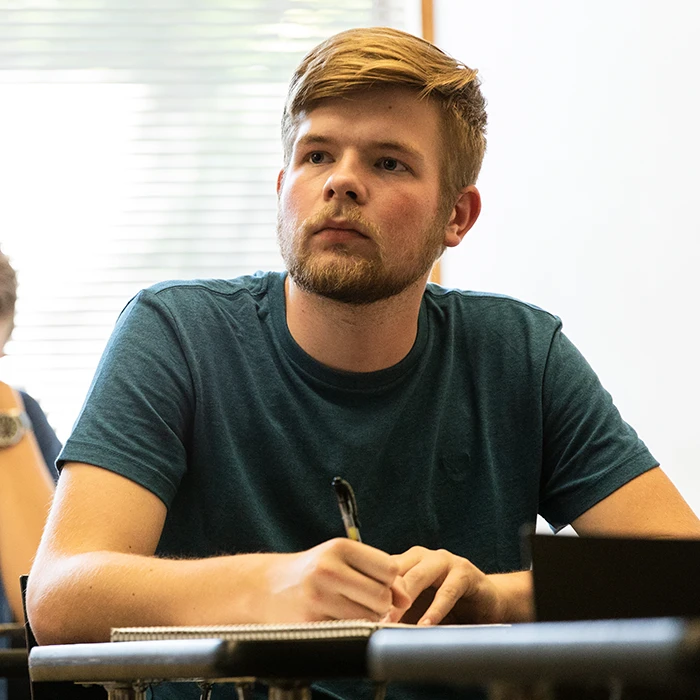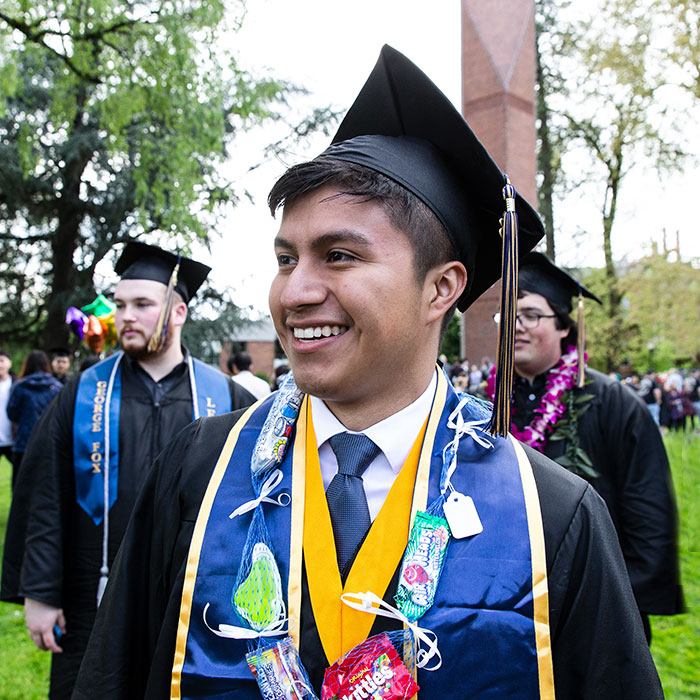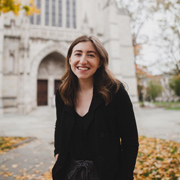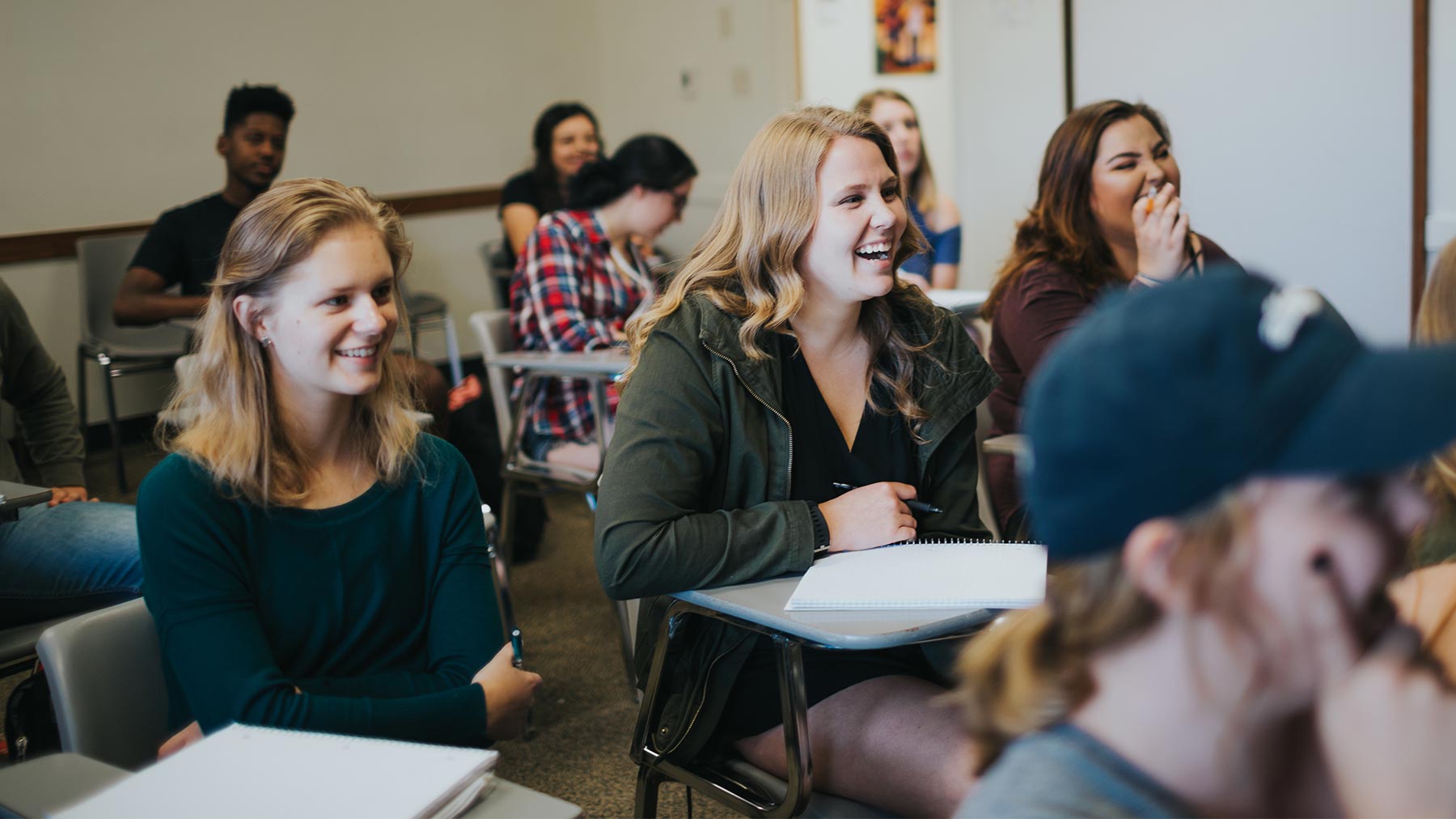At A Glance
Program Type
Concentration of the theology major (BA)
Accreditation
Northwest Commission on Colleges and Universities (NWCCU)
Professors
Learn from professors with extensive pastoral and ministry experience
Outcomes
Graduates have pursued careers in ministry, nonprofit leadership, business, and law

Nothing is of higher value than the Word of God. This foundational belief guides and supports our studies as we undertake the great privilege of endeavoring to understand the Bible better and more deeply.
Apply Scripture to Today’s World
The field of biblical studies, a concentration in our theology major, combines aspects of ancient language learning, history and research into the Mediterranean and ancient Near Eastern cultural world of the Bible with deep theological reflection, faith formation and a transformative relationship with God and God’s people.
You can specialize in the Old Testament or New Testament, and coursework in a variety of areas helps you view Scripture holistically, faithfully and with a mind toward the world we live in today. Learn, reflect, turn it into action. That’s our flow.
Service-Oriented Career Path
Biblical scholars are in service to people. They journey with individuals from all walks of life and at varying intellectual levels to ensure that the nuances of Scripture are understood. They bring grace and clarity by devoting themselves to the pursuit of meaning on behalf of others. They read, write and think deeply about what matters most in a confusing world.
Ultimately, they devote themselves to engaging with the spiritual hunger of those around them, walking with others down a path toward understanding.
Program Distinctives Why Study the Bible at George Fox?
-
We engage in a deep dive into the ancient biblical languages. Why read an already-translated text when you can translate it yourself?
-
Your professors have pastoral and ministry experience. They will lead and join your own journey of learning and growing as they continue to research and publish new work. This is a community where we all learn together.
-
We believe the Bible is current and can be applied today, to this cultural moment. And we don’t shy away from Christianity’s relationship to culture, whether it’s economics, government, art, science, technology, healthcare, etc.
-
This is a safe place to grow in your faith and ask deeper questions. We are ready to work with you to answer your questions, address doubts, and equip you to go out to live your Christian calling, wherever that may be.
Courses / Curriculum What Will I Study?
Career Outlook What’s After George Fox
Our graduates have gone on to careers in ministry, business, theater/acting, social work, nonprofit leadership, law school, marketing, nursing and graduate degrees at all levels around the world.
Data shows that those majoring in topics like religion, ancient languages and history, and philosophy rank near the top of test scores on the LSAT as well as the GRE. Courses within our department specialize in the exact skills that are now ranked as the most desirable for companies hiring new employees, such as problem solving, processing complex information, verbal and written communication, teamwork, and the ability to influence others.
- Night Ministry, Portland Rescue Mission
- Nurse, Sisters of Providence
- Youth Minister, 2nd Street Community Church
- Lead Strategist, Nike
- Dentist, La Clinica
- Translator, Wycliffe Bible Translators
- Chaplain, United States Air Force
- Adjunct Professor, University of Notre Dame
- Missionary in Indonesia, Wycliffe Bible Translators
- Principal, Newman Catholic Middle/High School
- English Teacher in Rwanda, Rwanda Yearly Meeting of Friends
- Red Hills Church
- Northside Community Church
- Church on the Hill
- National Parks (Denver, Colorado)
- Youth Dynamics
- Mission Year
- 2nd Street Community Church
- Love, INC
- Friendsview Retirement Community
- Minuteman Community Education
- Catholic Community Services
- Princeton Theological Seminary (M.Div)
- Yale Divinity School (M.A.R.)
- Yale Institute of Sacred Music (M.A.R.)
- Emory University (M.T.S.)
- Duke Divinity School (M.T.S.)
- Fuller Theological Seminary (M.A./M.Div.)
- Portland Seminary (M.Div/M.A.T.S.)
- Trinity Evangelical Divinity School (M.Div.)
- Western Seminary (M.Div.)
- Oxford University (M.A.)
- University of Edinburgh (M.A.)
- Regent College (M.A./M.Div.)

Grad’s passion for racial reconciliation is changing lives in Philadelphia
If there’s ever the temptation to get discouraged and give in – to let all the brokenness and heartbreak around him derail the work at hand – Jael K.D.L.V. Chambers doesn’t let on. He can’t afford to. The need is too great, the stakes too high.
As associate regional director for Young Life in Philadelphia, Chambers sees it all: the fatherless homes, the desperation of “the hood,” the palpable racial and political tension in the city. And yet, he remains unfazed. He’s witnessed too many instances of restoration and reconciliation to lose hope now.

Jenna Richards
George Fox prepared me to engage with those across the spectrum of religious thought in a way that is sensitive to differences while remaining academically rigorous. I learned ways in which my ‘head knowledge’ has practical and serious meaning for vulnerable, oppressed, and marginalized people. The field of theology is immensely political, relational, and has the potential to be socially radical. I feel most myself when learning, in all forms. I see wholeness in the intellectual tradition of my faith communities. At its best, a Christian education is a ministry of hospitality, and the School of Theology invites you in and teaches how to invite others into the world of theology, faith and academics.
Request Information About Biblical Studies
